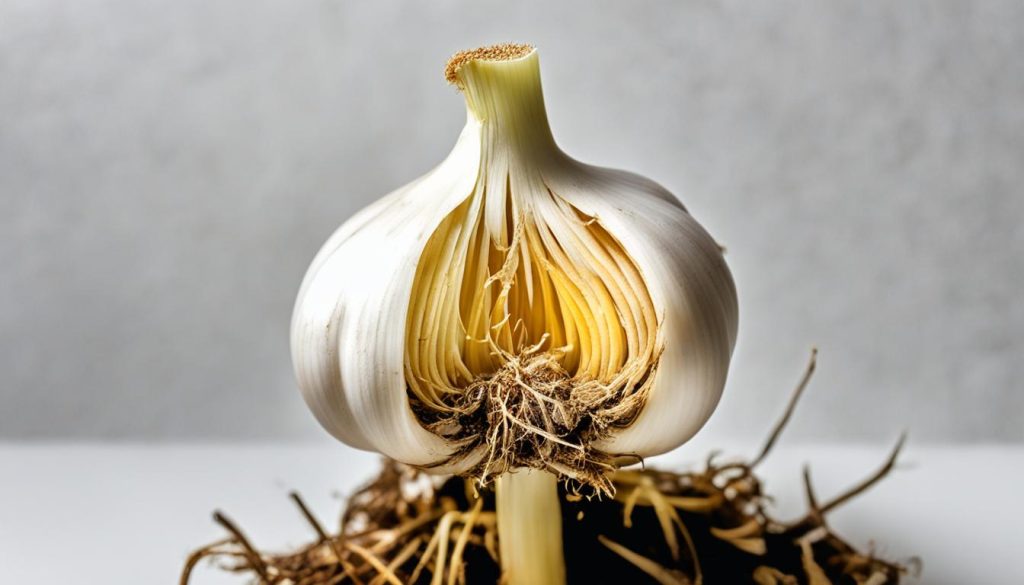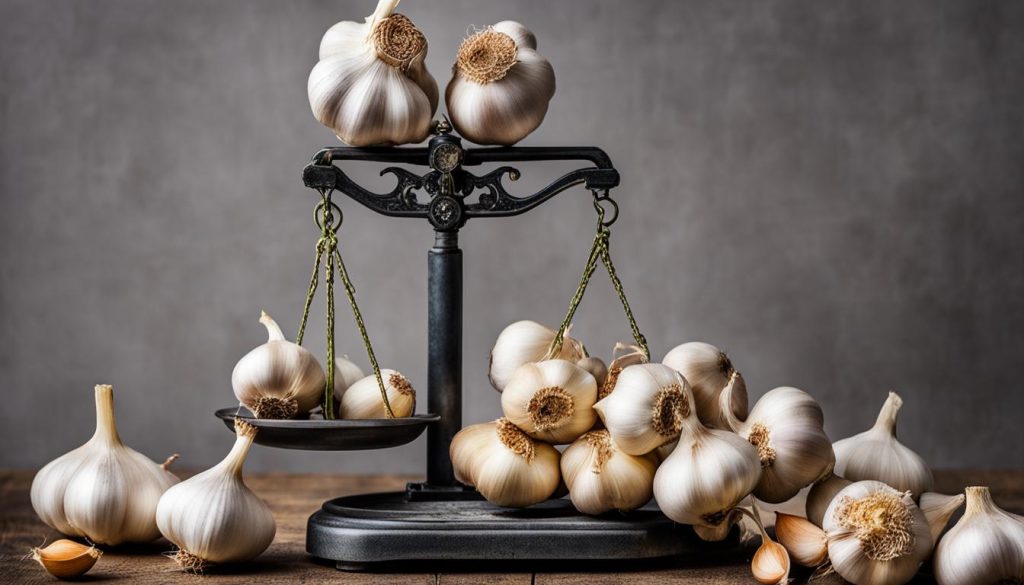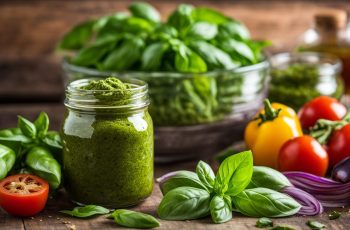Garlic, a versatile and flavorful ingredient used in cuisines around the world, offers more than just taste. Daily consumption of garlic can lead to various changes in the body, both positive and negative. So, what happens when you eat garlic every day? Let’s explore the surprising body changes that can occur.
What Happens When You Eat Garlic Every Day?
- Garlic has numerous health benefits, including lowering blood pressure, improving heart health, boosting the immune system, promoting digestion, aiding in weight loss, and providing overall well-being.
- However, it is important to be aware of potential side effects such as bad breath, heartburn, gas, diarrhea, skin irritation, and allergic reactions.
Garlic for Heart Health: Lowering Blood Pressure and Cholesterol
Garlic has long been recognized for its potential to improve heart health. Studies have shown that regular consumption of garlic can lower blood pressure and reduce the risk of cardiovascular diseases, including strokes and heart attacks.
The active compounds in garlic, particularly sulfur, have been found to have beneficial effects on blood pressure. These compounds help regulate blood pressure by enlarging blood vessels, allowing for better blood flow and reduced pressure on the arteries.
Furthermore, garlic has been shown to have a positive impact on cholesterol levels. It can lower total cholesterol levels, including the “bad” LDL cholesterol, while increasing the levels of “good” HDL cholesterol. This can help reduce the risk of plaque buildup in the arteries and decrease the likelihood of blood clot formation, ultimately improving heart health.
How Garlic Works for Heart Health
The key behind garlic’s heart-healthy properties lies in its active compounds, such as allicin. Allicin has antioxidant and anti-inflammatory effects, which play a role in reducing the risk of heart diseases. By reducing inflammation and oxidative stress in the blood vessels, garlic helps maintain their elasticity and prevents the accumulation of plaque.
Additionally, garlic has been found to have antithrombotic effects, meaning it can help prevent blood clot formation. This is beneficial for individuals with high blood pressure or a history of cardiovascular events, as blood clots can block blood flow and cause serious complications.
It is important to note that while garlic can contribute to heart health, it should not replace prescribed medications for chronic conditions. It is recommended to consult with a healthcare professional before incorporating garlic into your diet as a treatment for hypertension or as a supplement for heart health.
Garlic and Immune System Boost: Fighting Infections and Preventing Colds
Garlic is well-known for its incredible immune-boosting properties, making it a valuable ally when it comes to fighting infections and preventing colds. Its antibacterial, antiviral, and antifungal effects contribute to its ability to strengthen the immune system and enhance its defenses against pathogens.
One of the key compounds in garlic, called allicin, plays a crucial role in its immune-boosting effects. Allicin has been found to have potent antimicrobial properties, making it effective against a wide range of bacteria, viruses, and fungi that can potentially harm the body.
Regular consumption of garlic can help ward off infections by reducing the severity of cold and flu symptoms. It can also protect against certain types of cancer, thanks to its ability to inhibit the growth of cancer cells.
When the immune system is strong, it has a better ability to defend the body against harmful pathogens, reducing the risk of falling ill. By incorporating garlic into your diet, you can support overall immune function and enhance your resistance to infections.
How Garlic Boosts the Immune System:
- Antibacterial effects: Garlic can help fight against harmful bacteria, protecting the body from infections.
- Antiviral effects: Garlic has antiviral properties that can reduce the severity and duration of viral infections.
- Antifungal effects: Garlic’s antifungal properties can help combat fungal infections and yeast overgrowth.
- Strengthening immune defenses: Garlic’s immune-boosting compounds, such as allicin, strengthen the immune system’s ability to defend against pathogens.
To experience the immune-boosting benefits of garlic, consider adding it to your meals regularly. Whether you prefer using fresh garlic in your recipes, incorporating it into sauces and dressings, or taking garlic supplements, be sure to consult with a healthcare professional for personalized advice and guidance.

Garlic’s immune-boosting properties make it a valuable addition to a healthy lifestyle, helping to protect against infections and support overall well-being. By harnessing the power of garlic, you can strengthen your immune system and take proactive steps towards maintaining optimal health.
Garlic for Digestion: Promoting Gut Health and Relieving Digestive Issues
When it comes to promoting gut health and relieving digestive issues, garlic has proven to be a beneficial ingredient. Its unique properties make it a valuable addition to your diet for maintaining a healthy digestive system.
One of the key benefits of garlic is its anti-inflammatory properties. These properties can help reduce inflammation in the intestines, providing relief from common digestive issues such as bloating and discomfort. By consuming garlic regularly, you may experience improved digestion and a reduction in gastrointestinal inflammation.
Garlic also plays a significant role in maintaining a healthy balance of bacteria in the gut. It helps promote the growth of beneficial bacteria while inhibiting the growth of harmful bacteria. This balance is essential for proper digestion and overall gut health. By including garlic in your meals, you can support the natural balance of your gut microbiota.
Another traditional use of garlic is in the treatment of intestinal worms. Raw garlic has been historically known for its ability to expel these parasites from the digestive tract, promoting a healthier gut environment. However, it is crucial to note that seeking professional advice is recommended when considering garlic as a remedy for such conditions.
It is essential to consume garlic in moderation to avoid any potential adverse effects. While garlic is generally safe for most people, excessive consumption may lead to digestive disturbances such as heartburn, gas, or diarrhea. Consulting with a healthcare professional for personalized advice is always advised, especially for individuals with specific dietary requirements or pre-existing digestive conditions.
Overall, garlic can be a valuable addition to your diet for promoting gut health and relieving digestive issues. Its anti-inflammatory properties, ability to support beneficial gut bacteria, and historical use in treating intestinal worms all contribute to its digestive benefits. However, it is important to maintain a balanced approach and consult a healthcare professional before making any significant dietary changes or relying solely on garlic for digestive support.
What Happens When You Eat Garlic Every Day: Garlic and Other Health Benefits
Weight Loss, Detoxification, and More
In addition to its cardiovascular and immune-boosting benefits, garlic offers a multitude of other health advantages. Incorporating garlic into your daily diet may aid in weight loss by reducing the formation of adipose cells and boosting thermogenesis. Its unique antioxidants can help protect against certain types of cancer, including colorectal and stomach cancer. Furthermore, garlic possesses detoxifying properties that support the body’s natural detoxification process.
In traditional medicine, garlic has been utilized for various purposes, such as wound healing, wart treatment, and relieving joint inflammation. The versatility of garlic extends beyond its culinary applications, making it a remarkable natural remedy for promoting overall health and well-being.
Weight Loss Benefits of Garlic
Garlic has been shown to have potential weight loss benefits due to its ability to reduce the formation of adipose cells. Studies suggest that certain compounds in garlic may inhibit the differentiation and proliferation of fat cells, ultimately contributing to weight management.
Garlic and Cancer Prevention
Research indicates that regular consumption of garlic may help protect against certain types of cancer, such as colorectal and stomach cancer. Garlic’s antioxidants, particularly sulfur-containing compounds like allicin, contribute to its cancer-fighting properties. These compounds assist in neutralizing harmful free radicals and preventing the growth of cancer cells.
Garlic and Detoxification
Garlic possesses detoxifying properties that support the body’s natural detoxification process. Its sulfur compounds aid in the elimination of toxins and heavy metals from the body, assisting the liver in its vital detoxification role. Including garlic in your diet can help enhance the body’s ability to eliminate harmful substances and promote overall detoxification.
Overall, garlic’s benefits extend far beyond its delectable flavor and aroma. It can serve as a valuable addition to your diet, aiding in weight loss, cancer prevention, and natural detoxification. Embracing the power of garlic can be a simple and effective way to promote optimal health and wellness.

How to Consume Garlic: Raw, Cooked, or Supplements?
If you’re considering incorporating garlic into your daily diet, you have several options for consumption: raw, cooked, or in the form of supplements. Each method offers its own benefits and considerations.
1. Raw Garlic: Raw garlic is often considered the most potent in terms of health benefits. It contains a high concentration of active compounds, including allicin, which has antimicrobial and antioxidant properties. Consuming raw garlic may help boost your immune system, promote cardiovascular health, and offer other health benefits associated with garlic’s bioactive compounds.
2. Cooked Garlic: Cooking garlic can alter its properties and reduce the concentration of certain beneficial compounds. To retain the beneficial enzymes, it is recommended to cook garlic at temperatures below 140 degrees Fahrenheit. This way, you can still enjoy the flavor and some health benefits while minimizing the loss of garlic’s active compounds.
3. Garlic Supplements: Garlic supplements are available in various forms, such as capsules, tablets, or powders. These supplements are convenient and provide a consistent dosage of garlic’s active compounds. However, it is important to consult a healthcare professional before starting any daily supplement routine, as they can provide personalized advice and guidance on dosage and potential interactions with medications.
When deciding how to consume garlic, it’s important to consider your personal preferences, health goals, and any specific dietary or medical requirements. Experiment with different methods to find what works best for you. Incorporating garlic into your daily routine can provide a range of health benefits, but it’s always wise to consult with a healthcare professional for personalized advice.
Final Say: What Happens When You Eat Garlic Every Day?
Garlic is a powerful ingredient that offers a wide range of health benefits. Incorporating garlic into your daily diet can have a positive impact on various aspects of your well-being. One of the key advantages of garlic is its ability to improve heart health by lowering blood pressure and cholesterol levels. Additionally, garlic boosts the immune system, helping to fight off infections and prevent colds. It also promotes healthy digestion, relieving digestive issues and supporting gut health.
Furthermore, garlic has other notable benefits, such as potential weight loss support and detoxification properties. It may aid in weight loss by reducing the formation of adipose cells and increasing thermogenesis. Garlic’s antioxidants also help protect against certain types of cancer, including colorectal and stomach cancer. Moreover, garlic has been used in traditional medicine for healing wounds, treating warts, and easing joint inflammation.
While garlic provides significant health advantages, it is crucial to be aware of potential side effects. These include bad breath, heartburn, and skin irritation. As with any dietary changes or supplements, it is advisable to consult with a healthcare professional to ensure garlic consumption aligns with your specific health needs.
Garlic is a flavorful and nutritious addition to your diet that can enhance your overall well-being. With its numerous health benefits, including improved heart health, enhanced immune function, better digestion, potential weight loss support, and detoxification, garlic is a versatile ingredient that deserves a place in your meals. Remember to prioritize your health and seek personalized advice from a healthcare professional before making any significant dietary changes.
FAQ
What happens when you eat garlic every day?
Daily consumption of garlic can lead to various changes in the body, both positive and negative. Garlic has been found to have numerous health benefits, such as lowering blood pressure, improving heart health, boosting the immune system, reducing the risk of certain types of cancer, promoting digestion, aiding in weight loss, and providing overall well-being. However, it is important to be aware of potential side effects, including bad breath, heartburn, gas, diarrhea, skin irritation, and allergic reactions.
How does garlic benefit heart health?
Garlic has been shown to lower blood pressure and reduce the risk of cardiovascular diseases such as strokes and heart attacks. The active compounds in garlic, particularly sulfur, help regulate blood pressure by enlarging blood vessels. Additionally, garlic can lower total cholesterol levels and reduce the risk of blood clots, thus improving heart health. It is recommended to consult with a doctor before using garlic as a treatment for hypertension or as a supplement for heart health.
How does garlic boost the immune system?
Garlic has immune-boosting properties, thanks to its antibacterial, antiviral, and antifungal effects. It can help fight off infections, reduce the severity of cold and flu symptoms, and protect against certain types of cancer. Garlic’s compounds, such as allicin, help strengthen the immune system and enhance its ability to defend against pathogens. Consuming garlic regularly may help support overall immune function and improve resistance to infections.
How does garlic promote digestion?
Garlic is known to promote digestion and improve gut health. It has anti-inflammatory properties that can reduce inflammation in the intestines and alleviate digestive issues. Garlic also helps maintain a balance between good and bad bacteria in the gut, which is crucial for proper digestion. Additionally, raw garlic has been traditionally used to treat intestinal worms. However, it is advisable to consume garlic in moderation and consult a healthcare professional for personalized advice.
What are the other health benefits of garlic?
In addition to its cardiovascular and immune-boosting benefits, garlic has other health advantages. It may aid in weight loss by reducing the formation of adipose cells and increasing thermogenesis. Garlic’s antioxidants help protect against certain types of cancer, including colorectal and stomach cancer. It also has detoxifying properties, supporting the body’s natural detoxification process. Furthermore, garlic has been used in traditional medicine for various purposes, such as wound healing, wart treatment, and relieving joint inflammation.
How should garlic be consumed?
Garlic can be consumed raw, cooked, or in supplement form. Raw garlic is considered to have the most health benefits due to its high concentration of active compounds. However, cooking garlic can alter its properties, so it is recommended to heat it below 140 degrees Fahrenheit to retain its beneficial enzymes. Garlic supplements are also available, but it is important to consult a healthcare professional before starting any daily supplement routine.
What are the overall health benefits and side effects of garlic?
Garlic offers a range of health benefits, including improved heart health, enhanced immune function, better digestion, potential weight loss support, and detoxification. However, it is crucial to be mindful of potential side effects such as bad breath, heartburn, and skin irritation. Adding garlic to your diet can be a flavorful and nutritious way to boost your overall well-being, but always consult with a healthcare professional for personalized advice and guidance.




